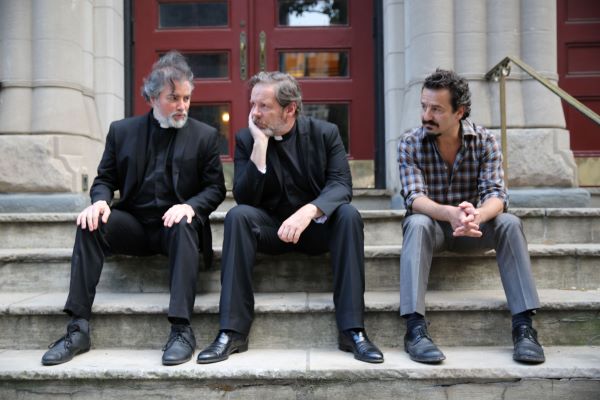In Spring of 2020, at the height of the initial lockdowns, were images that will find a place throughout history books: the streets of London, Hong Kong, Venice and even New York abandoned and silent – concrete metropolises silenced for the first time in decades. And gradually, peoples’ empathy grew for fellow neighbours, from the workers next door to the old friends struggling. And there was one area that suffered quite heavily, perhaps not financially, but spiritually – the church. Even those not following a doctrine of faith could see the anguish in many who were unable to practise, and realised the extent of the pandemic as buildings known for their sanctuary locked their doors.
For one New York City church, all it takes is someone to begin the healing process. When Father Andrew (Kevin Corrigan) agrees to meet with an old friend Paul (Max Casella), a man insistent in not only entering the church but removing his mask, the initial discomfort gives way to an understanding within Andrew concerning opening up the prospect of weddings, prayer, and confession. What first feels contrived, or worse, a Hallmark saviour saga on the dangers of skipping church, quickly inverts itself and not only poses questions, but relatively significant ones.
But this doesn’t stave off melodrama, with enough sickly treacle forced into scenes to incapacitate any diabetics in the audience. Writer and director Onur Tukel’s character insertion at random intervals monumentally slows the film, causing head-scratching inclusions as the interesting dialogue dynamics are interrupted by sudden U-turns, bleakly unnecessary characters, and awkward deliveries. Save for one, a confession from Father James (Thomas Jay Ryan), a second priest within the church. Unable to conceal the love they have felt for another, dearly departed soul, Father James opens up to Father Andrew and confides in him. It’s an intense few minutes, stepping directly into the eyes of the church and challenging the archaic ideologies. And here is where Scenes from an Empty Church excels – the leads.
All three don’t have the world to work with, limited even more so by the social-distancing practises and mask-concealing expressions. The lynchpin between these three comes in the form of fastidious Father James, armed with his disinfectant and face masks at all times. Completing the trifecta, Ryan takes the concerns and hypochondria many of us underwent at the initial stages of the pandemic, and to which many of us still adhere. Gradually, the audience comes to realise the hurt Father James has undergone, and the truth he’s felt he has to conceal. Ryan is approachable, even when indulging in the more ‘preachy’ sequences. His relationships with Father Andrew and Paul makes for the most compelling scenes as the trio sit around, breaking bread and talking about life, regrets, and religion.
And for Casella and Corrigan, perhaps more immediately relatable, the conversation the pair share about the importance of staying in touch with family and loved ones come with some touching moments. It’s just a shame the cinematography never capitalises on the locational shooting within the church to reinforce these scenes.
These more humble moments are Tukel’s assets and should take up a deal more of the film rather than surrendering to pander and filler. The flow is stilted in significant portions, with Andrew Shemin’s cinematic style creating a series of stops and starts rather than a continuous feel. Coming over as episodic, Scenes from an Empty Church doesn’t quite push for the style of vignettes or individual anthology pieces.
Scenes from a Quiet Church stretches little and looks more to the ease of access than a world of flash and gimmickry. The quaintness in its simplicity belays something more significantly wrong with Tukel’s film, in that despite its contemporary setting mid-pandemic, it already conjures a datedness. Where Scenes from a Quiet Church succeeds are in the relationships between these leads, reflecting not only on the current climate but their past choices in weighing up the way forward – as a piece of cinema.
Available On-demand now
